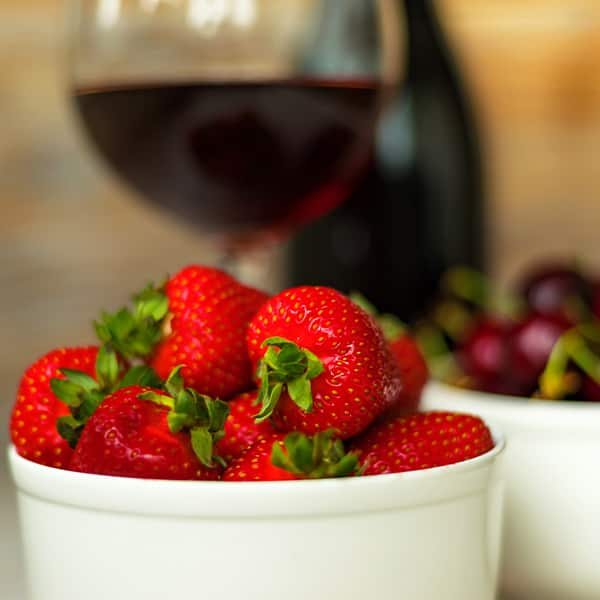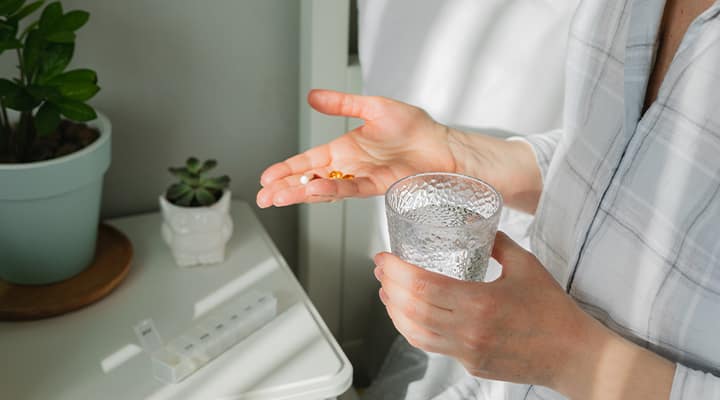
Quercetin Dihydrate vs. Quercetin: What’s the Difference?
Published: May 2024
Cutting up an onion may make you cry, but this vegetable contains a nutrient that you might want to keep in supply.
Now that our clever rhyme has your attention, it's time to solve this riddle: we're talking about quercetin. This nutrient is found not only in onions, but also in apples, berries, grapes, red wine…and, yes, supplements.
Speaking of which, you may have heard of both "quercetin supplements" and "quercetin dihydrate supplements." Are these the same? Which should you take?
Here's what to know about this nutrient and the best way to get its benefits.
What is quercetin?
Quercetin is a plant metabolite that belongs to a class of polyphenols called flavonoids, compounds that give certain fruits their characteristic red, blue and purple appearance. Don't worry, taking quercetin won't turn you blue, but it may yield certain health benefits and it is considered by many to be an important healthy aging supplement.
Why? Flavonoids like quercetin are modulators of oxidative stress and support a healthy inflammatory response, but it's difficult to get a high enough dose from diet alone to take advantage of those benefits. Because of this, many people choose to supplement.
And like most dietary supplements, quercetin is available in different forms (including the dihydrate form), making it hard to discern between these various types when you're comparing ingredients on a label. So how do you choose what to take?
What’s the difference between quercetin and quercetin dihydrate?
First things first: almost all dietary supplements that contain quercetin are found in the dihydrate form, with the main defining characteristic between quercetin and dihydrate coming down to the stability and solubility.
Quercetin exists in either a hydrous or an anhydrous state, which just means with or without water. If a compound has a hydrate, it means it contains a water molecule. "Di" means "two," so the dihydrate form contains two water molecules. These water molecules play an important role in how quercetin reacts in the body: namely, they allow quercetin to be more stable and soluble.
Quercetin dihydrate is considered a simple and inexpensive way to get more out of your quercetin. It's so popular and commonplace that even labels and published studies won't always specify dihydrate, opting to simply refer to the compound as quercetin.
So, in other words, if you're supplementing, you're more likely than not getting the superior quercetin dihydrate form and not the anhydrous quercetin. However, it's important to note that even though quercetin dihydrate is more stable and soluble than anhydrous quercetin, it still lacks bioavailability. Let me tell you about the most bioavailable form of quercetin in the next section.
What are the benefits of quercetin supplements?
As we covered, it's challenging to eat enough of the foods that contain quercetin. And of course, you don't want to rely on red wine to meet your quercetin needs—that's why it's much more efficient to supplement!
Researchers are continuously evaluating the effects of quercetin for a range of applications. Clinical research suggests that quercetin may be most supportive of a healthy immune system and cardiovascular health, but this nutrient has other important benefits, too:
Promotes a healthy inflammatory response—
Research has found that quercetin may be one of the most efficient supporters of a healthy inflammatory response. One meta-analysis of randomized-controlled trials even found quercetin supplementation helps inhibit inflammatory factors to support whole-body health.Inhibits oxidative stress—
Flavonoids all have antioxidant effects, with a clinical study finding that quercetin can positively affect markers of oxidative stress in red blood cells.Supports healthy immune function—
While supplements like zinc and vitamin D3 are imperative for immune support and proper nutrition, this fabulous flavonoid is not without its own benefits.Encourages healthy glucose metabolism—
Results from a meta-analysis of 9 randomized-controlled trials showed that quercetin supplementation in dosages of 500 mg a day or more with a duration of 8 weeks or more led to significant improvements in healthy glucose levels. People under the age of 45 showed improvements in healthy insulin levels.
A large randomized-controlled trial was conducted on quercetin evaluating immune challenges. The trial enrolled about 1,000 people, who supplemented with 1,000 mg daily of quercetin or a placebo. After 12 weeks those over the age of 40 with higher self-rated fitness who took quercetin had significantly fewer number of days experiencing immune challenges related to the upper respiratory tract compared to placebo.
Explore Our Best Immune Support Supplements
Promotes already-healthy blood pressure—
Multiple meta-analyses of clinical studies have demonstrated that quercetin may be a helpful tool in supporting already-healthy blood pressure levels.Improves healthy lipid markers—
Some clinical research suggests that at a dose of 500 mg or more daily, quercetin may support already-healthy triglyceride levels, but does not have a significant impact on healthy LDL and HDL cholesterol.Maintains healthy cells—
Perhaps one of the most interesting potential benefits of quercetin could be its senolytic properties, meaning it may help the body manage its senescent cell burden, a key component of healthy aging.
Pro tip: We cannot stress enough: you should never substitute any dietary supplement for exercise and good nutrition. However, adding quercetin to your supplement regimen may help you achieve these benefits more easily.
What’s the best form of quercetin?
We've already established that quercetin dihydrate is what's found in most quercetin supplements. But is it the best form? That answer really depends on your needs.
One of the pitfalls of both quercetin dihydrate and anhydrous quercetin is that both lack the bioavailability you may want. Luckily, research has found ways to overcome this.
If you are looking for a more bioavailable formula, seek out quercetin supplements that contain a hydrogel coating for enhanced effects and increased bioavailability. When quercetin dihydrate is combined with a hydrogel made from seeds from the fenugreek plant it can better help deliver this nutrient to its target tissues in the body.
And the research backs it up. In a randomized clinical study, a blend of quercetin that contained a hydrogel coating led to serum levels of total quercetin up to 62 times higher than the quercetin without the hydrogel. This increased bioavailability is believed to allow quercetin to do a better job as an antioxidant and quench free radicals throughout the body.
But, as we mentioned, you should choose based on your individual needs. For example, some quercetin dihydrate formulas add other ingredients like vitamin C for additional immune support. But if you want the best of both worlds, you can combine classic quercetin dihydrate with the more bioavailable quercetin.
How to take quercetin supplements
As always with any dietary supplement, it is best to follow the instructions on the label. Generally, it is not necessary to take more than 1,000 milligrams of quercetin dihydrate at a time. When quercetin is in a more bioavailable form, less is more. Smaller doses can be used to achieve the same effects of quercetin observed at higher dosages.
References
- Duranti G, et al. "Chronic consumption of quercetin reduces erythrocytes oxidative damage: Evaluation at resting and after eccentric exercise in humans." Nutrition Research (New York, N.Y.). February 2018. https://pubmed.ncbi.nlm.nih.gov/29540274/
- Heinz SA, et al. "Quercetin supplementation and upper respiratory tract infection: A randomized community clinical trial." Pharmacological Research. September 2010. https://www.ncbi.nlm.nih.gov/pmc/articles/PMC7128946/
- Joseph A, et al. "Enhanced Bioavailability and Pharmacokinetics of a Natural Self-Emulsifying Reversible Hybrid-Hydrogel System of Quercetin: A Randomized Double-Blinded Comparative Crossover Study." ACS Omega. December 2022. https://pubmed.ncbi.nlm.nih.gov/36570285/
- Keerthi S, et al. "Solubility and solution thermodynamic properties of quercetin and quercetin dihydrate in subcritical water." Journal of Food Engineering. September 2010. https://www.sciencedirect.com/science/article/pii/S0260877410001822
- Klitou P, et al. "Navigating the Complex Solid Form Landscape of the Quercetin Flavonoid Molecule." Cryst Growth Des. July 2023. https://www.ncbi.nlm.nih.gov/pmc/articles/PMC10401642/
- Li W, et al. "Emerging senolytic agents derived from natural products." Mechanisms of Ageing and Development. July 2019. https://pubmed.ncbi.nlm.nih.gov/31077707/
- Ostadmohammadi V, et al. "Effects of quercetin supplementation on glycemic control among patients with metabolic syndrome and related disorders: A systematic review and meta-analysis of randomized controlled trials." Phytotherapy Research. May 2019. https://pubmed.ncbi.nlm.nih.gov/30848564/
- Ou Q, et al. "Impact of quercetin on systemic levels of inflammation: a meta-analysis of randomised controlled human trials." Int J Food Sci Nutr. March 2020. https://pubmed.ncbi.nlm.nih.gov/31213101/
- Popiolek-Kalisz J, Fornal E. "The Effects of Quercetin Supplementation on Blood Pressure - Meta-Analysis." Curr Probl Cardiol. November 2022. https://pubmed.ncbi.nlm.nih.gov/35948195/
- Sahebkar A. "Effects of quercetin supplementation on lipid profile: A systematic review and meta-analysis of randomized controlled trials." Critical Reviews in Food Science and Nutrition. March 2017. https://doi.org/10.1080/10408398.2014.948609
- Serban MC, et al. "Effects of Quercetin on Blood Pressure: A Systematic Review and Meta-Analysis of Randomized Controlled Trials." Journal of the American Heart Association. July 2016. https://pubmed.ncbi.nlm.nih.gov/27405810/
Always be in the know!
Access the latest deals, wellness news, expert health tips & more!











